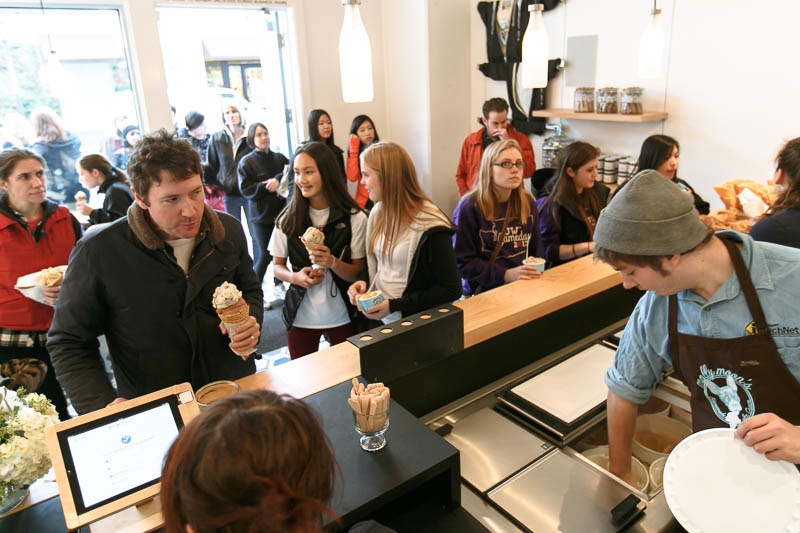By Molly Moon Neitzel
When I first decided to open an ice cream shop, I knew that one of my goals would be to pay all of my employees a living wage. So I wrote it into my business plan, along with a few other things that were important to me, like paying 100% of the health insurance premiums for my employees and making sure all my product and packaging was compostable. I had my share of critics; there were plenty of people who said I was crazy, and that I would never be able to make a profit.
Seven years later, my company has grown from one shop with 7 employees in 2008 to six ice cream shops, with just under 100 employees during our busiest months. What I’ve learned is that taking care of my employees and paying a living wage is absolutely the right thing to do, and it’s also good business strategy.
Having a healthy, robust group of employees has a great impact on our community, and goes beyond just writing paychecks. It helps us recruit top talent, and it makes for a more loyal workforce and lower turnover which reduces training costs. Incorporating values into business strategy can also help your marketing plans. I know that, as a customer, I choose to spend money with businesses that share my values and I think my customers do, too.
Many people working full time on today’s minimum wage aren’t able to support themselves. I believe that as a community, we have to be willing to make some changes so that everyone in our city can have a chance to thrive.
I wasn’t the only one in my community who supported this logic. In 2013, a small grassroots campaign started in Seattle to increase the local minimum wage to $15 an hour. I joined in solidarity with that effort and decided to pay all non-tipped employees at least that amount. (Other employees in our company make about $8 an hour in tips, on top of the $9.32 Washington minimum wage.)
Along the path to a minimum wage increase in Seattle, it became clear to us that a consumer-driven economy needs an increase in low-wage earners’ pay, and that a minimum wage increase is good for business. More money in low-wage workers’ pockets will result in more money spent in all businesses. One thing I learned during this campaign was that it’s important for business owners to be aware of the additional costs and rewards that come with raising the minimum wage. I know this may cost me more in the short-term, with significant increases in payroll. But the investment will yield significant rewards for my workers, community and my business’ bottom line. Not to mention my customers – many of whom will also be getting raises, and celebrating with more trips to the ice cream shop.
While $15 an hour is right for Seattle, it might not work for every part of the country. Nonetheless, the current national minimum wage of $7.25 per hour is too low, regardless of what state and city you call home. The national minimum wage needs to be raised to $10.10 to give low-wage workers a much needed boost, and a shot in the arm to our economy.
More To Read
April 17, 2024
2023-24 Impact and Gratitude Report
Reflecting on a year of progress and transition at EOI
April 12, 2024
Welcoming our New Executive Director, Rian Watt!
EOI is excited to begin its next chapter under new leadership
April 4, 2024
Is There a Valid Argument Against Cost-Free College in Washington?
Cost-free college is a meaningful investment that would change lives. What's stopping Washington from making it happen?


